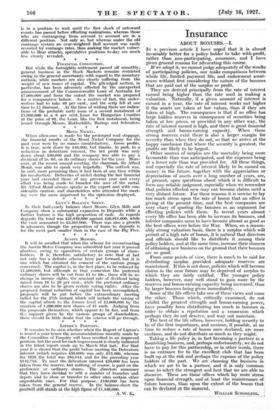Insurance
ABOUT BONUSES.---I.
IN a previmis article I have urged. that it is almost invariably better for a 'policy holder to -take with-profit, rather than ..non-participating, assurance, and I. have given general reasons for advocating this course. If we adopt it, we cannot judge adequately of the results of participating policies, nor make comparisons between whole life, limited payment life, and endowment assur- ances without first considering the nature of the bonuses that are paid out of the surplus or profit. They are derived principally from the rate of interest earned being higher than the rate used in making a valuation. Naturally, if a given amount of interest is earned in a year, the rate of interest works out higher if the assets are taken at low values, than if they are taken at high. The consequence is that if an office has large hidden reserves in consequence of securities being taken at low prices, or provided in any other way, the rate of interest earned is high, and there is great financial strength and bonus-earning capacity. When these strong reserves exist there is also a larger margin for security than when they do not, so that we arrive at the happy conclusion that where the security is greatest, the profits are likely to be largest.
Other sources of surplus are the mortality being more favourable than was anticipated, and the expenses being at a lower rate than was provided for All these things, and especially the rate of interest likely to be earned on money in the future, together with the appreciation or depreciation of assets over a Jong number of years, are, at present, open questions about which it is difficult to form any reliable judgment, especially when we remember that policies effected now may not become claims until a very distant future. For these reasons it is unwise to lay too much stress upon the rate of bonus that an office is giving at the present time,_ and the best companies are very chary of quoting the bonuSes as an argument for effecting policies with them. In recent years almost • every life office has been able to increase its bonuses, and • inferior companies seem to have become almost as good as the best offices were before the War. When, on a reason- ably strong valuation basis, there is a surplus which will permit of a high rate of bonus, it is natural that directors and officials should like to distribute it among their policy holders, and at the same time, increase their chances of obtaining new business on the ground that their bonuses are so good.
From some points of view, there is much to be said for distributing surplus provided adequate reserves are maintained. If this is not done, policies which will become claims in the near future may be deprived of surplus to which they are fairly entitled. The younger policy holders, however, may well stand to gain more by the reserves and bonus-earning capacity being increased, than by larger bonuses being given immediately".
Some of the life offices take one of these views and some the other. Those which, critically examined, do not exhibit the greatest strength and bonus-earning power,- have possibly been distributing too much in bonuses in order to obtain a reputation and a connexion which perhaps they do not deserve, and may not maintain.
The best of the life offices, however, holding security to be of the first importance, and anxious, if possible,. at no time to reduce a rate of bonus once declared, are more, cautious, and do not-distribute so much as they might.
Taking a life policy is, in fact becoming a partner in a flourishing business, and, perhaps unfortunately, we do not have to pay for this partnership, or in other words, there is no entrance fee to the excellent club that ..has been built up at the risk and perhaps the expense of the policy holders of the past. We are choosing the business in which we are to be a - partner, and it is only common sense to select the strongest and best that we are able to discoier. These are those offices which lay more stress upon financial strength, and at. least the maintenance of future bonuses, than upon the extent of the bonus that can be declared at the moment.
WILLIAM SCHOOLING.










































 Previous page
Previous page